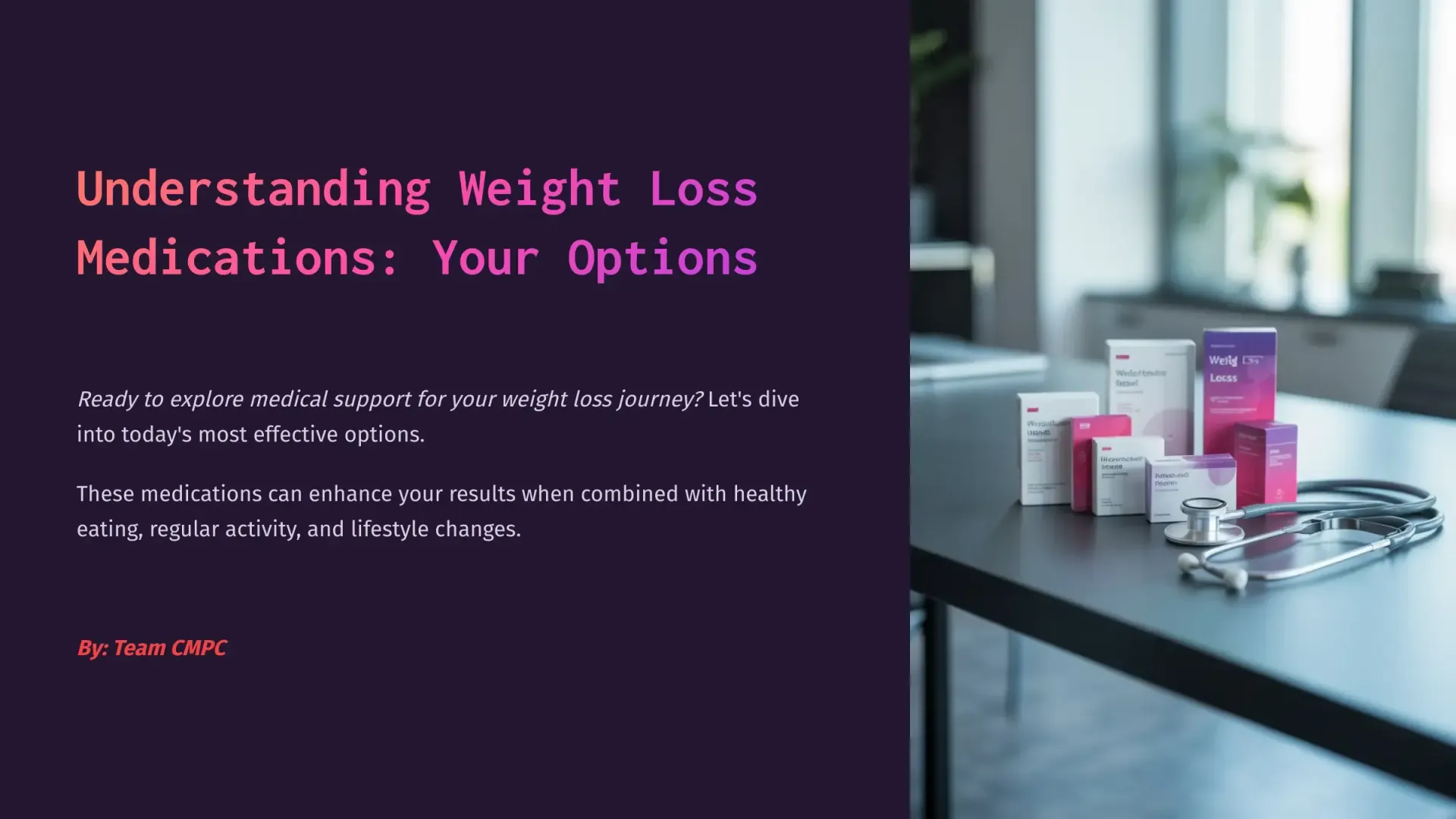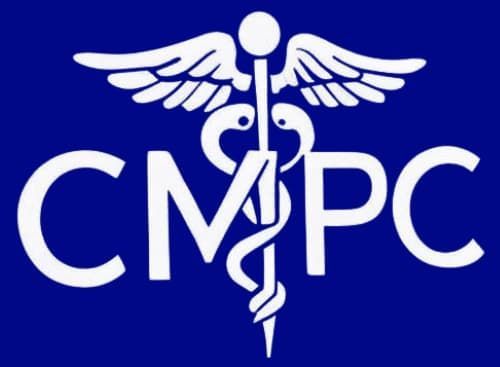
Understanding Weight Loss Medications: What You Need to Know
For many of our patients across Ottawa struggling with obesity and high BMI, weight loss medications often represent a beacon of hope after years of frustrating diet and exercise attempts.
At CMPC, we understand the challenges and concerns you face when considering medical interventions for weight management. While these medications can be practical tools in your weight loss journey, they come with essential considerations regarding side effects and safety profiles.
Today, we're addressing one of our patient's most common questions during consultations: "Are there side effects from taking weight loss medications?"
This comprehensive guide will help you understand what to expect, how to minimize risks, and when these medications might be appropriate for your weight management plan.

Common Types of Weight Loss Medications
Before discussing side effects, it's helpful to understand the main categories of weight loss medications currently available:
Appetite Suppressants
These medications affect the brain's hunger signals and neurotransmitters that control appetite. By reducing hunger sensations or increasing feelings of fullness, they help patients consume fewer calories throughout the day:
- How they work: They typically target receptors in the brain involved in appetite regulation and mood, particularly those affecting serotonin and norepinephrine.
- Common examples: Phentermine (Adipex-P, Lomaira), Diethylpropion, and newer combination medications like Qsymia (phentermine-topiramate).
- Typical effectiveness: Patients may experience 5-10% weight loss combined with lifestyle modifications.
Lipase Inhibitors
Rather than affecting the brain, lipase inhibitors work in your digestive system:
- How they work: These medications block the enzyme lipase, which breaks down dietary fat in your intestines. This prevents some fat absorption, reducing calorie intake.
- Common examples: Orlistat (Xenical, Alli).
- Typical effectiveness: Generally results in more modest weight loss, typically 3-5% of body weight, when combined with diet and exercise.
GLP-1 Receptor Agonists
Initially developed for diabetes management, these have become increasingly popular for weight management:
- How they work: They mimic a hormone called glucagon-like peptide-1 (GLP-1) that targets areas in the brain regulating appetite, slowing stomach emptying and increasing feelings of fullness.
- Common examples: Semaglutide (Wegovy, Ozempic), Liraglutide (Saxenda), and Tirzepatide (Mounjaro).
- Typical effectiveness: This can lead to significant weight loss of 10-15% or more in many patients.
Other Medications
Several other types of medications may be prescribed for weight loss in specific circumstances:
- Combination medications: Medications that combine different mechanisms of action, such as Contrave (naltrexone-bupropion).
- Off-label options: Medications approved for other conditions but sometimes used for weight management, including certain antidepressants, anti-seizure medications, or diabetes drugs.
- Emerging therapies: New medications currently in clinical trials that target different biological pathways involved in weight regulation.
Common Side Effects of Weight Loss Medications
All medications have potential side effects, and weight loss drugs are no exception. Understanding these potential effects can help you make informed decisions about your treatment. Here's what our patients commonly experience with different classes of weight loss medications:
Appetite Suppressant Side Effects
These medications can affect various body systems due to their impact on brain chemistry:
- Cardiovascular effects: Increased heart rate, elevated blood pressure, and palpitations can occur, making regular monitoring essential.
- Central nervous system effects: Insomnia, restlessness, nervousness, dizziness, headaches, and in some cases, mood changes, including anxiety or depression.
- Digestive system effects: Dry mouth, constipation, and occasionally nausea or stomach pain.
- Other potential effects: Increased sweating, changes in taste perception, and potential for medication dependence with certain suppressants.
We always conduct thorough assessments before considering these medications for patients with existing cardiovascular conditions, as they might not suit everyone.
Lipase Inhibitor Side Effects
Since these medications affect fat digestion, their side effects are primarily gastrointestinal:
- Common digestive symptoms: Oily spotting on underwear, flatulence with discharge, urgent bowel movements, oily or fatty stools, increased number of bowel movements, and inability to control bowel movements.
- Nutritional concerns: Reduced absorption of fat-soluble vitamins (A, D, E, K) requiring potential supplementation.
- Timing-related effects: Side effects usually worsen when consuming meals with higher fat content.
These effects tend to be most pronounced during the initial weeks of treatment and often improve as patients adjust their diet to moderate fat intake.
GLP-1 Receptor Agonist Side Effects
As these medications have gained popularity for significant weight loss results, understanding their side effects is particularly important:
- Digestive system effects: Nausea, vomiting, diarrhea, constipation, and abdominal pain are common, especially during the initial dose titration period.
- Injection site reactions: For injectable forms, redness, irritation, or discomfort at the injection site may occur.
- Rare but serious concerns: Pancreatitis (inflammation of the pancreas), gallbladder problems, and kidney issues have been reported in rare cases.
- Impact on existing conditions: These medications can affect blood sugar levels, requiring careful monitoring in patients with diabetes.
With proper medical supervision and gradual dose escalation, many patients find these side effects manageable and temporary.
Factors That Influence Side Effect Risk and Severity
Various individual factors may affect your likelihood of experiencing side effects from weight loss medications:
Patient-Specific Factors
Personal characteristics and health status play a crucial role in medication tolerance:
- Pre-existing health conditions: Patients with cardiovascular disease, psychiatric disorders, thyroid abnormalities, or kidney/liver dysfunction may experience different or more severe side effects.
- Age: Older adults may metabolize medications differently, potentially experiencing lower-dose side effects.
- Medication interactions: Current prescription drugs, over-the-counter medications, and supplements can interact with weight loss medications, altering their effects or side effect profiles.
- Genetic factors: Genetic variations in drug metabolism can influence how your body processes these medications.
Medication-Related Factors
Aspects of the medication itself also influence side effect patterns:
- Dosage: Higher doses typically carry a greater risk of side effects, so we often start with lower doses and gradually increase as tolerated.
- Duration of treatment: Some side effects diminish over time as your body adjusts, while others may develop with longer-term use.
- Formulation: Extended-release versions may cause fewer immediate side effects than immediate-release formulations.
- Adherence to instructions: Taking medications exactly as prescribed, including timing relative to meals, can significantly reduce side effect risk.
Minimizing Side Effects: Practical Strategies
At CMPC, we work closely with our Ottawa patients to minimize side effects while maximizing weight loss benefits. Here are the strategies we recommend:
Medical Supervision and Monitoring
Regular check-ins with healthcare providers ensure early detection and management of side effects:
- Baseline testing: Before starting medication, comprehensive health assessments help identify risk factors.
- Regular follow-up appointments: These allow for monitoring of vital signs, symptoms, and weight loss progress.
- Laboratory monitoring: Periodic blood tests can detect metabolic changes or potential organ system effects.
- Medication adjustments: Dosage modifications based on response and side effect profile optimize the risk-benefit ratio.
Lifestyle Modifications
Certain habits can significantly reduce the likelihood or severity of side effects:
- Dietary adjustments: For lipase inhibitors, gradually reducing dietary fat intake can minimize gastrointestinal effects. For medications that may cause nausea, smaller, more frequent meals might help.
- Hydration: Adequate water intake can reduce constipation risk and help manage dry mouth symptoms.
- Timing considerations: Taking medications at specific times relative to meals or bedtime can improve tolerance.
- Gradual introduction: Starting with lower doses and slowly increasing allows your body to adjust more comfortably.
Complementary Approaches
Additional strategies to manage specific side effects include:
- Managing nausea: Small, low-fat meals; avoiding spicy or rich foods; ginger tea or prescribed anti-nausea medications if necessary.
- Addressing constipation: Increased fibre intake, adequate hydration, regular physical activity, or gentle laxatives as recommended.
- Combating insomnia: Proper sleep hygiene, stimulating medications earlier in the day, and relaxation techniques.
- Reducing dry mouth: Sugar-free gum, frequent sips of water, and avoiding alcohol and caffeine.
When to Consider Weight Loss Medications Despite Potential Side Effects
Weighing the benefits against possible side effects is an important part of decision-making. Here are situations when medication might be worth considering:
Medical Necessity
For many individuals, the health benefits of weight loss outweigh the risk of medication side effects:
- Obesity-related health conditions: If you have diabetes, hypertension, sleep apnea, or fatty liver disease, that could improve with weight loss.
- High cardiovascular risk: When obesity significantly increases your risk of heart attack or stroke.
- Joint problems: When excess weight contributes to debilitating joint pain or mobility issues.
- Metabolic syndrome: When you have multiple risk factors that could be improved through weight reduction.
Previous Treatment Failures
When other approaches haven't yielded results, medication may be appropriate:
- Unsuccessful lifestyle modifications: If you've consistently followed diet and exercise programs without achieving meaningful weight loss.
- Weight regain: If you've lost but repeatedly regained it despite continued efforts.
- Difficulty maintaining changes: When psychological or physiological factors make sustaining lifestyle changes exceptionally challenging.
Psychological Benefits
The psychological impact of successful weight loss can sometimes justify accepting some side effect risks:
- Improved body image and self-esteem: When obesity significantly impacts mental health and quality of life.
- Enhanced motivation: Initial medication-assisted weight loss can motivate continued lifestyle changes.
- Breaking cycles of disordered eating: When medication helps establish healthier eating patterns that can eventually be maintained without pharmaceutical support.
Alternatives to Consider: The Allurion Gastric Balloon System
For patients concerned about medication side effects, non-pharmaceutical options like the Allurion Gastric Balloon System offer an alternative approach:
How It Compares to Medications
The Allurion system provides several advantages over pharmaceutical approaches:
- No daily medication: Eliminates concerns about medication side effects, drug interactions, or daily compliance.
- Time-limited intervention: The balloon remains in place for approximately 16 weeks, avoiding long-term pharmaceutical exposure.
- No systemic absorption: Many medication-related side effects are avoided because they work locally in the stomach rather than throughout the body.
- Structured program: Includes nutritional support and lifestyle coaching, addressing the root causes of weight gain.
Potential Side Effects of the Allurion System
While avoiding medication side effects, the balloon system has its considerations:
- Initial adjustment period: Some patients experience nausea, vomiting, or abdominal discomfort during the first few days after placement.
- The sensation of fullness: While this is the intended effect, the feeling can initially be uncomfortable for some individuals.
- Rare complications: In uncommon cases, issues like early balloon deflation, intestinal obstruction, or gastric ulceration may occur.
- Psychological adjustment: Adapting to reduced food intake can be challenging for some patients.
In our experience, most patients find these temporary effects manageable, especially with our comprehensive support system.
Making an Informed Decision: Questions to Ask Your Healthcare Provider
Before starting any weight loss medication, consider discussing these points with your healthcare provider:
Medical Considerations
Understanding your risk profile is essential:
- Personal risk assessment: "Based on my medical history, which side effects am I most at risk for?"
- Monitoring protocol: "What specific signs or symptoms should I watch for, and how will we monitor for potential complications?"
- Expected timeline: "How long might I need to take this medication, and does long-term use change the side effect profile?"
- Interaction concerns: "Could this medication interact with my current medications or supplements?"
Benefit Analysis
Clarifying expected outcomes helps set realistic expectations:
- Realistic results: "What amount of weight loss might I expect from this medication?"
- Health improvements: "Beyond weight loss, what specific health metrics might improve with this treatment?"
- Success indicators: "How will we determine if the medication works effectively enough to justify any side effects?"
- Alternative options: "If this medication causes intolerable side effects, what other options might we consider?"
Weight Loss Medication Myths vs. Facts
Many misconceptions exist about weight loss medications. Let's address some common myths we hear from our patients:
Myth: Weight Loss Medications Always Cause Dangerous Side Effects
Fact: While all medications have potential side effects, modern weight loss medications have improved safety profiles compared to earlier generations. The key is appropriate patient selection, proper dosing, and regular monitoring.
Myth: Once You Start Weight Loss Medication, You'll Need It Forever
Fact: Many patients use medications as temporary tools to establish healthier habits. Some may discontinue medication after reaching their goals, while others benefit from longer-term use. The approach should be individualized.
Myth: Side Effects Mean the Medication Isn't Right for You
Fact: Many side effects are temporary or can be managed with dosage adjustments or simple strategies. Initial side effects often improve as your body adjusts to the medication.
Myth: Natural Weight Loss Supplements Are Safer Than Prescription Medications
Fact: Many "natural" weight loss supplements lack scientific evidence for effectiveness and safety. Unlike prescription medications, they undergo minimal regulatory oversight. Prescription medications, while having documented side effects, have been studied extensively for safety.
Myth: Weight Loss Medications Work the Same for Everyone
Fact: Response to weight loss medications varies significantly between individuals. Genetics, metabolism, underlying health conditions, and lifestyle influence both effectiveness and side effect profiles.
The CMPC Approach to Medication Management
At CMPC, we take a comprehensive approach to weight management that minimizes side effects while maximizing benefits:
Personalized Assessment
We begin with a thorough evaluation to determine the most appropriate intervention:
- Comprehensive health evaluation: We assess your complete health history, current medications, and risk factors.
- Body composition analysis: Understanding your specific body composition helps us tailor treatments appropriately.
- Metabolic testing: We evaluate metabolic factors that might influence medication response when indicated.
- Psychological readiness: We assess motivation, expectations, and potential barriers to success.
Integrated Treatment Approach
Rather than relying solely on medication, we combine multiple effective strategies:
- Medical nutrition therapy: Personalized dietary guidance reduces side effects and enhances weight loss.
- Behavioural modification: Addressing eating behaviours and emotional triggers reduces reliance on medication alone.
- Physical activity guidance: Appropriate exercise recommendations complement medication effects.
- Stress management techniques: Reducing stress can improve medication tolerance and weight loss success.
Ongoing Support and Monitoring
Our support doesn't end with the prescription:
- Regular check-ins: Scheduled appointments help us track progress and address concerns promptly.
- Adjustment protocol: We modify treatment plans based on your response and any side effects.
- Educational resources: We provide extensive information about managing potential side effects.
- 24/7 access: Our patients can reach out with concerns about the effects of medication.
Taking the Next Step: When to Seek Professional Help
If you're considering weight loss medication but are concerned about side effects, here are signs it's time to consult with weight management professionals like our team at CMPC:
Health Indicators
Certain health situations warrant medical intervention for weight:
- BMI over 30: Generally considered the clinical threshold for obesity.
- BMI over 27 with complications: When weight-related health conditions are present.
- Increasing health markers: Rising blood pressure, cholesterol, or blood sugar levels related to weight.
- Joint pain or mobility issues: When excess weight impacts physical functioning.
Previous Experience
Your weight loss history provides essential context:
- Multiple diet attempts: Having tried numerous structured diet programs without lasting success.
- Weight cycling: Repeatedly losing and regaining significant amounts of weight.
- Difficulty with adherence: Struggling to maintain recommended lifestyle changes despite genuine efforts.
- Emotional impact: When weight issues significantly affect mental health and quality of life.
Your Weight Management Journey: Beyond Medications
While medications can be valuable tools, sustainable weight management encompasses much more:
Holistic Approach to Weight Management
At CMPC, we emphasize comprehensive care:
- Addressing root causes: Identifying and managing underlying factors contributing to weight gain.
- Building sustainable habits: Developing eating and activity patterns that can be maintained long-term.
- Psychological support: Managing emotional aspects of eating and body image concerns.
- Environmental modifications: Creating a home and work environment that supports healthy choices.
The Role of Medical Support
Professional guidance offers significant advantages:
- Evidence-based approaches: Access to treatments proven effective through scientific research.
- Safety monitoring: Regular assessment minimizes risks and addresses concerns promptly.
- Accountability and motivation: Regular check-ins help maintain focus on health goals.
- Troubleshooting assistance: Professional help navigating plateaus and challenges.
Your Path Forward
Living with obesity presents both challenges and opportunities:
- Local resources: Our community offers numerous supports for healthy living, from extensive trail systems to indoor facilities for year-round activity.
- Seasonal considerations: We guide maintaining healthy habits throughout the year's distinct seasons, from summer heat to winter snow.
- Cultural diversity: Our approaches respect the diverse cultural backgrounds of our patients, incorporating culturally appropriate dietary recommendations.
- Community connection: We can connect you with local support groups and resources to enhance your weight management journey.
Finding Balance: The Right Approach for You
Weight management is highly individual, and the perfect solution varies from person to person:
- Risk-benefit analysis: Working together to determine if expected health benefits justify potential side effects.
- Trial periods: A limited medication trial sometimes provides valuable information about individual responses.
- Combination approaches: A combination of interventions often provides the best results with minimal side effects.
- Regular reassessment: Your needs and the optimal approach may change over time, requiring periodic reevaluation.
We're Here to Help: The CMPC Commitment
For those struggling with obesity, CMPC offers specialized expertise in weight management:
Our Comprehensive Services
Our weight management programs include multiple pathways to success:
- Medical weight management: Including appropriate medication when indicated.
- Allurion Gastric Balloon System: A non-surgical, non-pharmaceutical option for significant weight loss.
- Nutritional counselling: Personalized dietary guidance from qualified professionals.
- Behavioural support: Strategies to address psychological aspects of eating and weight.
- Long-term maintenance programs: Continued support after initial weight loss success.
Moving Forward with Confidence
Understanding the potential side effects of weight loss medications is vital in making informed healthcare decisions. While side effects are a consideration, they must be balanced against the significant health risks of untreated obesity and the potential benefits of successful weight management.
At CMPC, we guide our patients through these complex decisions with compassion, expertise, and personalized care. If you're concerned about your weight and considering medical interventions, we encourage you to reach out for a comprehensive assessment. Together, we can determine the approach that offers you the most significant benefit with manageable risk.
Would you like to learn more about non-pharmaceutical options for weight management?
Read our article "Will non-surgical options like gastric balloons work for me?" to explore alternatives to medication-based approaches.
Ready to take the first step toward healthier weight management in Ottawa?
Call us NOW to schedule your comprehensive weight assessment and discover the right approach.










